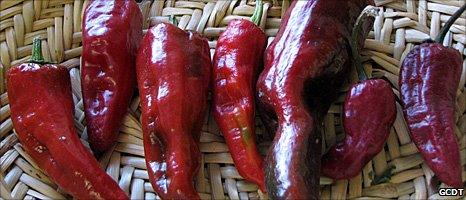'Red hot' chillies arrive at frozen seed vault
- Published

Chillies cultivated by Native Americans are among those entering the vault
Seeds from some of North America's hottest food crops have arrived on the Arctic Archipelago of Svalbard to be stored in a "doomsday vault".
The consignment of chilli seeds was delivered to the frozen outpost by a delegation of seven US senators.
Built deep inside a mountain, the vault is designed to protect the world's main food plants from future disasters.
Since opening in 2008, it has stored seeds from more than half a million of the planet's crops.
"The chillies really are an interesting story," said Cary Fowler, executive director of the Global Crop Diversity Trust, which funds the operation and management of the seed vault.
"They are traditional varieties; they have colourful names and histories," he told 大象传媒 News.
"A number of the varieties were provided by a fantastic group of nine US government organisations called Native Seed Search who work with Native American communities.
"These (chilli plant) varieties have been safeguarded for a long time and long may it continue," Dr Fowler added
"But that - of course - depends on an unbroken chain going into the future and you can never really count on such a thing."
In from the cold
Among the varieties to be deposited in the vault was Wenk's Yellow Hots, a pepper that starts out yellow and hot before losing some of its potency and turning red.
The remote, frozen landscape provides an ideal backdrop for the vault
Another specimen was the "unpredictable" San Juan Tsile, described as a pepper with a heat that has been described as "ranging as anything from mild to medium to hot".
This particular variety is still cultivated by elder farmers in a Native American community in New Mexico.
The group delivering the seeds was led by Benjamin Cardin, Democrat Senator for Maryland, who said the all parts of the world were interdependent when it came to crop diversity.
"As we manage the impact of climate change around the world, the seed vault in Svalbard will be the safety deposit box that ensures that we can keep that food supply intact," he said.
The seeds from the chilli plants, along with other samples such as soy, melon and sorghum, were provided by the US Department of Agriculture's (USDA) National Plant Germplasm, based in Colorado.
"[We] have a strong commitment to sharing our crop diversity to ensure that Svalbard is well positioned to protect the world's genetic diversity," explained Edward Knipling, administrator for the USDA's Agricultural Research Service (ARS).
The seeds are preserved at a temperature of -18C (-0.4F) in two secure store rooms located 130m (426ft) inside a mountain.
The vault has been designed to store duplicates of seeds from collections from all around the world.
If the nation's seeds are lost as a result of a natural disaster, such as widespread flooding, the seed collections could be re-established using the specimens stored in the Arctic.
The 拢5m ($7m) facility took 12 months to build and opened in February 2008.